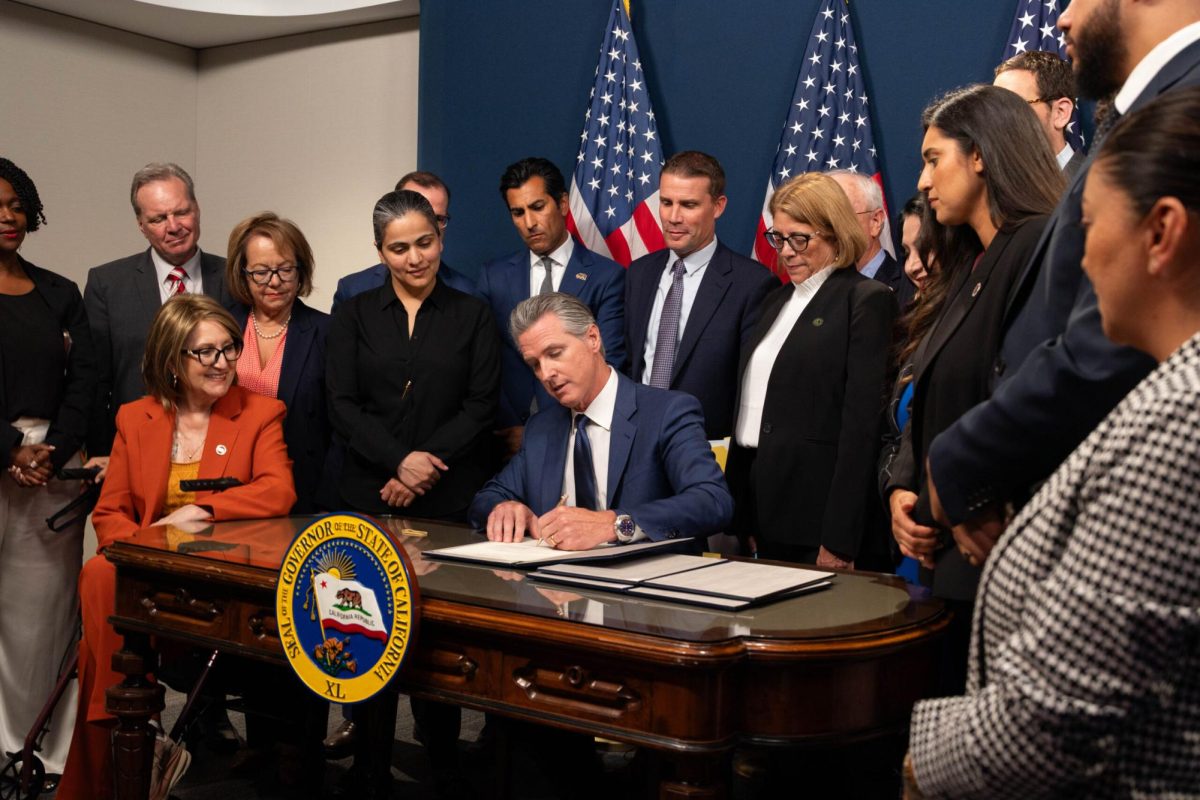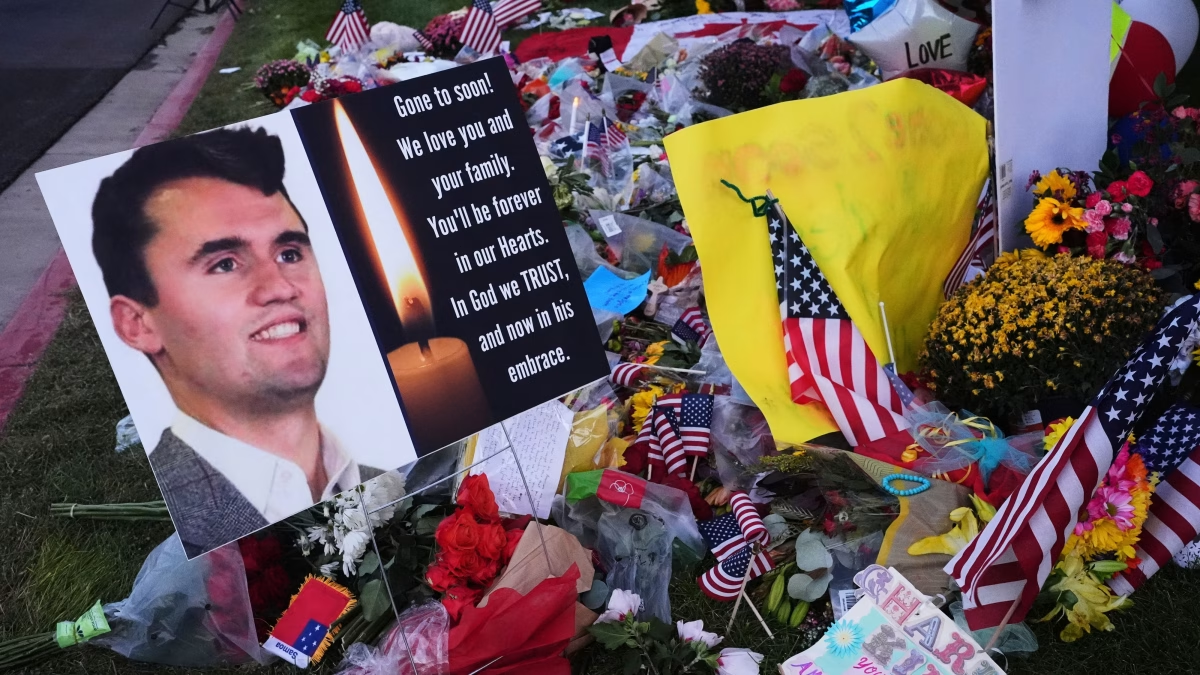Born October 14, 1993 in the Chicago suburbs of Arlington Heights, Illinois, Charlie Kirk was a 31-year-old conservative activist at the time of his death. He was married to former Miss Arizona, Erika Kirk, and together had two children, a three year old daughter and a one year old son.
Emerging as one of the most recognized and, at times, controversial voices of his generation, Kirk built a career that blended politics, media, and activism. But on September 10, 2025 Kirk’s life was fatally brought to an end.
Kirk’s rise began in 2012 after his essay for right-wing Breitbart News, in which he accused schools of spreading leftist “propaganda,” caught the eye of Bill Montgomery, a Tea Party activist. Montgomery took Kirk under his wing and together they co-founded Turning Point USA, an American nonprofit organization that advocates for conservative views and politics on high school, college, and university campuses, later that year.
The group grew rapidly, with chapters on hundreds of college campuses across the country. Its mission was to,“ identify, educate, train, and organize students to promote the principles of freedom, free markets, and limited government.”

Critics however, argued that the organization became increasingly partisan, aligning itself almost entirely with Republican politics and relying on provocative campus events to stir controversy.
These included the launch of the Professor Watchlist, which publicly named professors accused of promoting “leftist propaganda,” and Kirk’s signature “Prove me Wrong” debate tours, where students were invited to challenge him directly. Both events often drew large crowds, counter protests, and heated debate, highlighting the confrontational nature and atmosphere Kirk and TPUSA cultivated on college campuses.
Kirk’s influence expanded well beyond campus activism. He launched his talk show titled The Charlie Kirk Show in 2019, which developed into a popular daily podcast and later a syndicated program on Salem Radio Network. He also authored several books, including Campus Battlefield (2018) and The MAGA Doctrine (2020).
Known for his fast-paced debating style and conservative opinions, Kirk rapidly gained a large following on social media platforms, such as X (formerly Twitter) and YouTube, where his speeches and clips often went viral. He became a frequent guest on Fox News and a familiar figure at conservative conferences, including speaking at both the 2016 and 2020 Republican National Conventions.
Over time, Kirk became a prominent supporter of Donald Trump, becoming closely associated with Trump and his political movement. He positioned himself as one of Trump’s most vocal millennial supporters, often echoing the former president’s controversial rhetoric on immigration, foreign policy, and election integrity.
During the 2020 election, Kirk played an active role in youth outreach for Trump’s campaign, frequently appearing at rallies and leveraging his media presence to energize young conservatives. Trump himself praised Kirk on several occasions, crediting him with helping mobilize a generation that Republicans had often struggled to reach.

The relationship deepened in the years following Trump’s presidency. After January 6, 2021, when Trump’s allies faced widespread backlash for spreading claims of election fraud, Kirk doubled down on his loyalty.
He defended Trump’s message, questioned the legitimacy of the 2020 election, and became a leading voice in the “Stop the Steal” narrative, in which supporters of Trump claimed the elections would be rigged against him causing him to lose. While controversial, this stance further cemented his reputation as one of Trump’s most loyal allies. By 2024, as Trump launched another run for the White House, Kirk and Turning Point USA were seen as crucial in rallying younger voters.
Kirk’s events often blended cultural grievances with political messaging in ways that mirrored Trump’s movement and its future leaders.
Kirk’s personal life also became a part of his public image. His wife, Erika Kirk, a former Miss Arizona and a podcast host, often shared his platform. She frequently spoke about faith, family, and cultural issues, complementing Kirk’s political commentary with her own advocacy.
Together, they projected themselves as a model conservative family that’s rooted in young, outspoken, and traditional values. Their children were occasionally mentioned in speeches and online posts, reinforcing Kirk’s emphasis on family as a cornerstone of his political identity. This personal branding helped Kirk connect with audiences who saw him not just as a political figure but as a husband and father embodying the ideals he promoted.
In 2024, his public image shifted dramatically following his outspoken perspectives towards gay marriage and abortion. Clips of a Jubilee debate video, Can 25 Liberal College Students Outsmart 1 Conservative?, circulated widely on TikTok and other platforms.
Millions of viewers saw Kirk challenge liberal students in a tense debate. The viral spread of these clips amplified both his fan base and his critics, cementing him as a polarizing figure. That visibility fueled his “American Comeback Tour,” a nationwide campus tour designed to bring his confrontational but highly publicized style of debate directly to students.

Kirk’s public life was defined by heated debates and a controversial political rhetoric, often sparking strong reactions from supporters and critics alike. Yet in the aftermath of his death, his personal life offered a moment of unexpected forgiveness that contrasted sharply with the controversy he often inspired.
At Kirk’s memorial at the State Farm Stadium in Glendale, Arizona, his wife Erika delivered an emotional speech that quickly captured national attention. Standing before friends, family, and political allies, she publicly forgave her husband’s killer, choosing compassion over vengeance.
Erika’s act of forgiveness drew both praise and criticism, supporters saw it as a powerful example of humanity, while critics questioned whether it overlooked the severity of political violence.
Kirk’s story, marked by intense public debate, viral notoriety, and unwavering political allegiance, serves as a reminder of the power and consequences of words in today’s political climate. While his death highlights the dangers of escalating rhetoric and violence, Erika Kirk’s act of forgiveness offers a contrasting message: that even in the wake of tragedy, compassion and understanding are possible.
Her choice underscores the need for dialogue rooted in respect, for treating opposing views not as enemies but as fellow citizens, and for finding common ground even amid deep political divisions.













